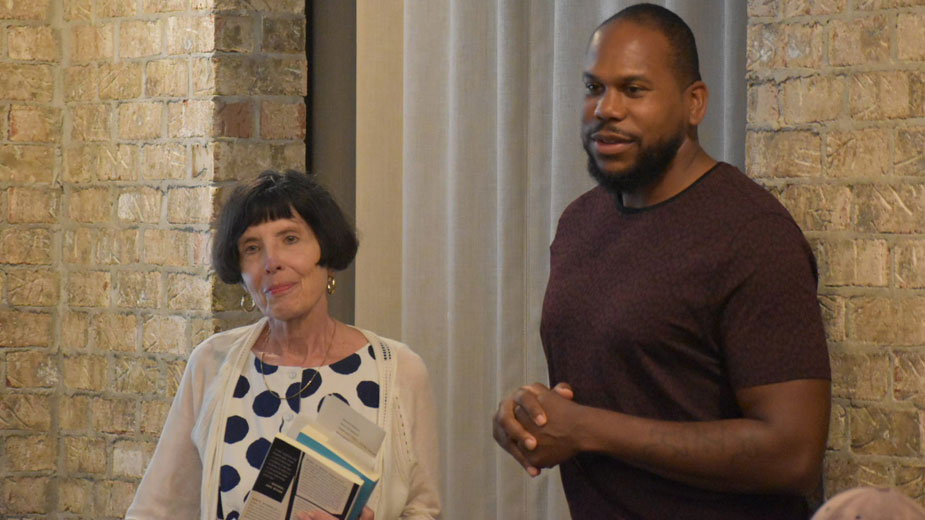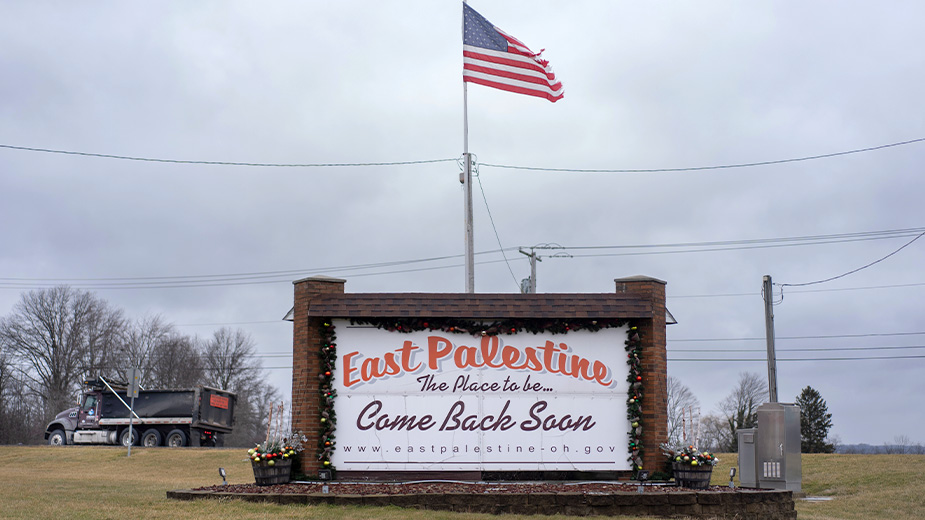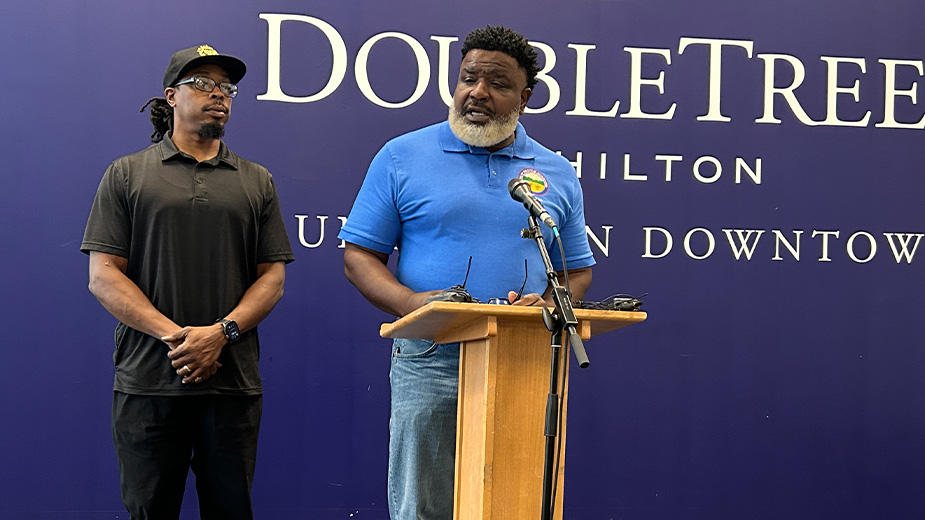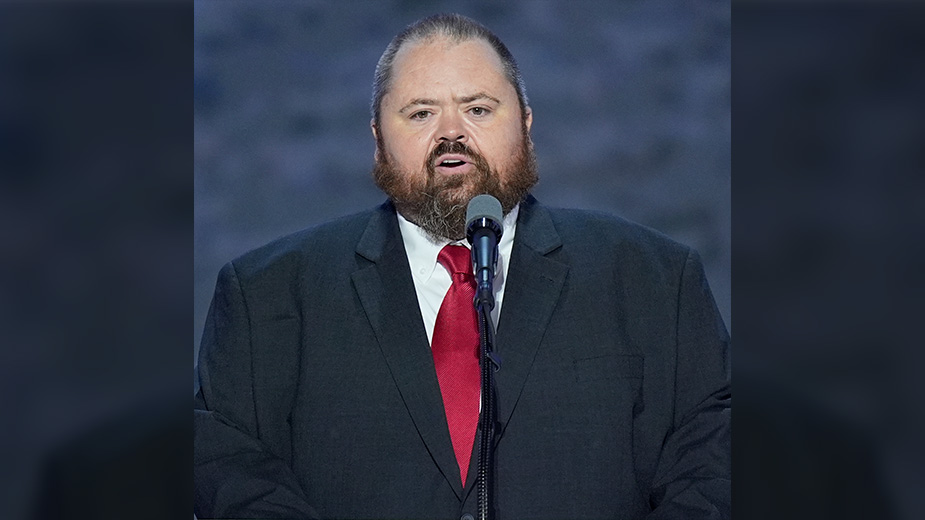Sojourn Leaders Discuss Floyd’s Death, Racism
YOUNGSTOWN, Ohio – The death of George Floyd while in Minneapolis police custody represents an opportunity for change, but that change won’t be easy, say representatives of Mahoning Valley Sojourn to the Past.
The program’s director, Penny Wells, and Derrick McDowell, a member of its board of directors, discussed Floyd’s killing and its impact Wednesday.
Wells and McDowell, who have taken part in recent protests calling attention to Floyd’s death and issues such as police brutality and systemic racism, addressed members of the Rotary Club of Youngstown, which met at Cassese’s MVR. The meeting was the club’s first since public gatherings were halted in March because of the coronavirus pandemic.
Sojourn to the Past takes high-school students to sites in the South that were settings for prominent events in the civil rights movement. The image of Floyd with a police officer’s knee on his neck, Wells said, brought to mind photographs associated with the Civil Rights Movement, including images of the bombed 16th Street Baptist Church in Birmingham, Ala., where four young girls were killed, police dogs being loosed on children as young as 5, and fire hoses turned on civil rights demonstrators.
The photographs, which appeared in newspapers across the country and on television, “awakened white America” to an issue black Americans already are aware of, she said.
“Right now, we’re in one of those moments,” said McDowell.
“It’s sort of like a rollercoaster,” he said. “We’re going and we’re going up, but if you don’t have enough momentum, that rollercoaster will go right back to where it began.”
Floyd’s death can provide an opportunity for momentum around conversations and reform efforts, but McDowell is seeing efforts to “wash our hands of this moment with anything we can that will pull steam and momentum from this moment,” he said. He cited comments indicating that reform efforts will lose support when the topic of race is introduced.
“We just have to make sure that this awakening doesn’t just die down,” but that it brings about changes not only in the law but also in procedures, policies and people’s hearts, Wells said. “We need to have more conversation and more dialogue and more interaction.”
Wells also showed a printout of a social media post by LeBron James that linked former pro quarterback Colin Kaepernick’s peaceful protest of police brutality with the image of fired police officer Derek Chauvin with his knee on Floyd’s neck before he died.
Kaepernick’s protest – during which he would take a knee during the playing of the National Anthem — had nothing to do with being anti-patriotic or disrespecting the American flag or the U.S. military, but instead was meant to highlight injustice, Wells said. Kaepernick was vilified at the time by the National Football League and President Trump and others, but more people now, including NFL Commissioner Roger Goodell, say they understand the message he was trying to convey.
She also referenced comments by Bryan Stevenson, head of the Equal Justice initiative and author of Just Mercy, during a trip to Africa, specifically the cost where Africans were sent off to slavery in America. While nations such as Germany and South Africa have expressed regrets over their past wrongs, he noted that the United States has “never been willing to acknowledge the horrific things we’ve done,” she said.
“Until we acknowledge that, we can’t move onto reconciliation. We all need to acknowledge this is what happened in our country, then what we are going to do and how we are wiling to take action,” she said. “Each of us needs to look at ourselves and decide what role do I need to play as individuals to bring about racial and social justice and equality.”
Students involved with Sojourn to the Past are planning a workshop for adults to address the issue of white privilege, which “those of us who are white have, whether we want to admit it or not,” Wells said. Even people who consider themselves liberal have the most difficulty recognizing their biases.
“We are embedded with biases and racism, just because this country was founded by white people on the backs of people of color,” she said. “It’s embedded and we’re not even aware of it.”
Barbara Brothers, a retired instructor and dean at Youngstown State University, brought up as an example of white privilege when armed protestors entered the Ohio Statehouse in Columbus last month to protest the state stay-at-home order to combat the spread of the coronavirus. As opposed to those protesting following Floyd’s death, who were met with force, the mostly white protestors were not confronted with weapons.
“They were clearly white,” Brothers said. “Those things have been important to visually see. It helps me to understand what white privilege really is.”
Overt racism is easier to address than systemic or institutional racism, Wells also said.
Following the meeting, Elayne Bozick, a real estate agent with Berkshire Hathaway HomeServices and a Youngtown Rotary member, called for further conversation. “We need to have more conversations and we need to find some common ground,” she said.
Bozick also said she was “outraged” when she saw the Floyd video, and further angered by some of the reaction. Some supposedly “religious people” have expressed the opinion that Floyd “wasn’t a very nice man,” though they acknowledged he didn’t deserve to die.
“How do they know he wasn’t a very nice man? Give me some evidence to support that. Is it because he was black that he want a very nice man?” Bozick said. “What I saw was some guy getting yanked out of his vehicle and murdered for no apparent reason.”
Samantha Turner, Third Ward councilwoman, will take office next month as the Youngstown club’s president, the first black person to fill the role in its 105-year history.
She has had several “hard conversations” with people in the weeks since Floyd’s death, she said. Things like policies and mindsets need to change, and some issues will be easier to address than others, she acknowledged. She is working on drafting a resolution defining racism as a public health concern.
“We just want to reaffirm to their community that this is a high priority for us,” she said. The goal is to work with the administration and the city health department to create “a more fair and equitable city government,” she said.
Copyright 2024 The Business Journal, Youngstown, Ohio.



